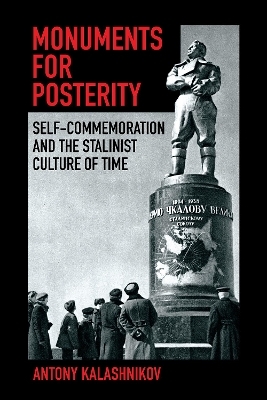
Monuments for Posterity
Self-Commemoration and the Stalinist Culture of Time
Seiten
2024
Cornell University Press (Verlag)
978-1-5017-7427-0 (ISBN)
Cornell University Press (Verlag)
978-1-5017-7427-0 (ISBN)
Monuments for Posterity challenges the common assumption that Stalinist monuments were constructed with an immediate, propagandistic function, arguing instead that they were designed to memorialize the present for an imagined posterity. In this respect, even while pursuing its monument-building program with a singular ruthlessness and on an unprecedented scale, the Stalinist regime was broadly in step with transnational monument-building trends of the era and their undergirding cultural dynamics.
By integrating approaches from cultural history, art criticism, and memory studies, along with previously unexplored archival material, Antony Kalashnikov examines the origin and implementation of the Stalinist monument-building program from the perspective of its goal to "immortalize the memory" of the era. He analyzes how this objective affected the design and composition of Stalinist monuments, what cultural factors prompted the sudden and powerful yearning to be remembered, and most importantly, what the culture of self-commemoration revealed about changing outlooks on the future—both in the Soviet Union and beyond its borders.
Monuments for Posterity shifts the perspective from monuments' political-ideological content to the desire to be remembered and prompts a much-needed reconsideration of the supposed uniqueness of both Stalinist aesthetics and the temporal culture that they expressed. Many Stalinist monuments still stand prominently in postsocialist cityscapes and remain the subject of continual heated political controversy. Kalashnikov makes manifest monuments' intentional attempts to seduce us—the "posterity" for whom they were built.
By integrating approaches from cultural history, art criticism, and memory studies, along with previously unexplored archival material, Antony Kalashnikov examines the origin and implementation of the Stalinist monument-building program from the perspective of its goal to "immortalize the memory" of the era. He analyzes how this objective affected the design and composition of Stalinist monuments, what cultural factors prompted the sudden and powerful yearning to be remembered, and most importantly, what the culture of self-commemoration revealed about changing outlooks on the future—both in the Soviet Union and beyond its borders.
Monuments for Posterity shifts the perspective from monuments' political-ideological content to the desire to be remembered and prompts a much-needed reconsideration of the supposed uniqueness of both Stalinist aesthetics and the temporal culture that they expressed. Many Stalinist monuments still stand prominently in postsocialist cityscapes and remain the subject of continual heated political controversy. Kalashnikov makes manifest monuments' intentional attempts to seduce us—the "posterity" for whom they were built.
Antony Kalashnikov is Postdoctoral Fellow in History at the University of Waterloo.
| Erscheinungsdatum | 03.06.2024 |
|---|---|
| Zusatzinfo | 15 Halftones, black and white |
| Verlagsort | Ithaca |
| Sprache | englisch |
| Maße | 152 x 229 mm |
| Gewicht | 454 g |
| Themenwelt | Sozialwissenschaften ► Politik / Verwaltung |
| Technik ► Architektur | |
| ISBN-10 | 1-5017-7427-1 / 1501774271 |
| ISBN-13 | 978-1-5017-7427-0 / 9781501774270 |
| Zustand | Neuware |
| Informationen gemäß Produktsicherheitsverordnung (GPSR) | |
| Haben Sie eine Frage zum Produkt? |
Mehr entdecken
aus dem Bereich
aus dem Bereich
die Weltmacht im Hintergrund
Buch | Softcover (2022)
Klarsicht Verlag
CHF 30,80
zur Rolle der Gewerkschaften in der Friedensbewegung
Buch (2024)
Westfälisches Dampfboot (Verlag)
CHF 27,95
Forschungsmethoden und Forschendes Lernen
Buch | Softcover (2023)
Kohlhammer (Verlag)
CHF 39,95


